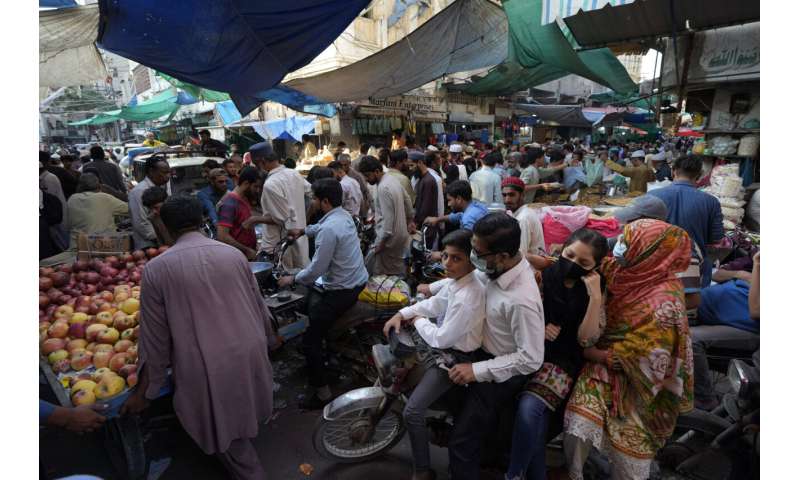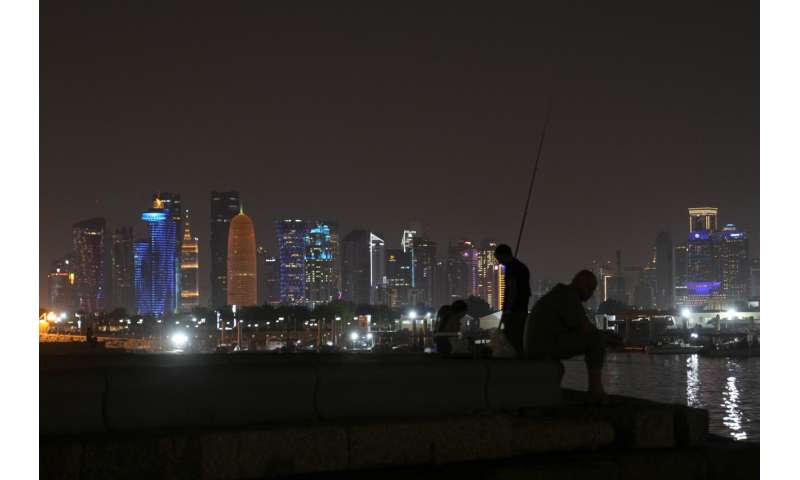Earth at 8 billion: Consumption not crowd is key to climate
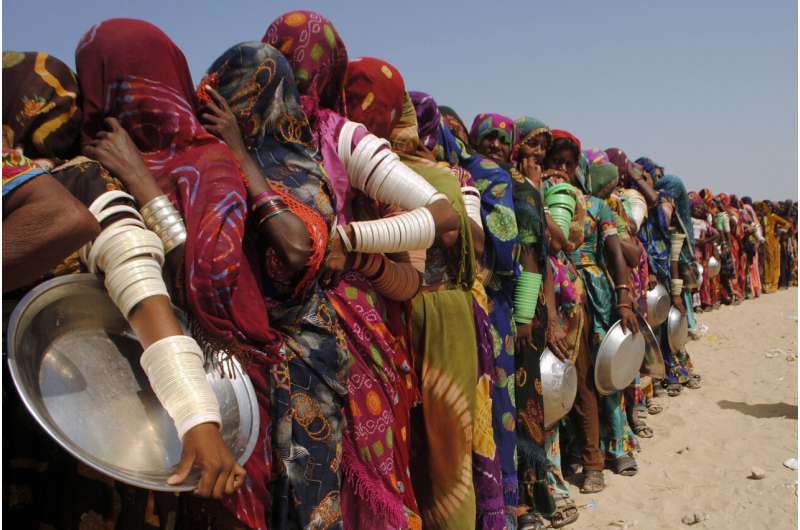
The world is getting hotter and more crowded and the two issues are connected, but not quite as much as people might think, experts say.
On Tuesday somewhere a baby will be born that will be the globe’s 8 billionth person, according to a projection by the United Nations and other experts. The Earth has warmed almost 0.9 degrees Celsius (1.6 degrees Fahrenheit) since the world hit the 4 billion mark in 1974.
Climate and population is a touchy subject for scientists and officials.
While more people consuming energy, mostly from the burning of fossil fuels, is warming the planet, the key issue isn’t the number of people as much as how a small fraction of those people are causing way more than their share of carbon pollution, several climate and population experts told The Associated Press.
“We do have a population problem and we do have a population issue,” said Vanessa Perez-Cicera, director of the Global Economics Center at the World Resources Institute. “But I think most importantly, we have an overconsumption issue.”
And because of that the 8 billionth child born will “not have what we had … because there’s not enough resources,” she said.
Kenya, which is suffering through a devastating drought, has 55 million people, about 95 times more than the population of Wyoming. But Wyoming emits 3.7 times the carbon dioxide as Kenya. Africa as whole has 16.7% of the world’s population but historically emits only 3% of the global carbon pollution, while the United States has 4.5% of the planet’s people but since 1959 has put out 21.5% of the heat-trapping carbon dioxide.
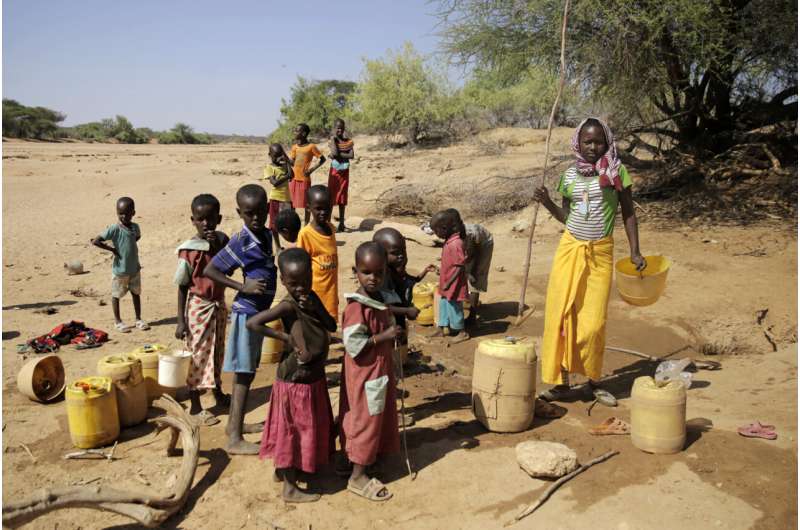
The average Canadian, Saudi and Australian put out more than 10 times the carbon dioxide into the air though their daily living than the average Pakistani, where one-third of the nation was flooded in a climate change worsened event. And in Qatar the per capita emissions is 20 times Pakistan’s, according to the World Bank.
“The question is not about population but rather about consumption patterns,” said climate scientist Bill Hare of Climate Analytics. “So it’s best to look at the major northern emitters to begin with.”
Climate Interactive, a group of scientists who run intricate computer simulations that can be tweaked to see what factors matter the most in fighting climate change, looked at the difference population makes. It found it made a small contribution compared to other factors, like economics.
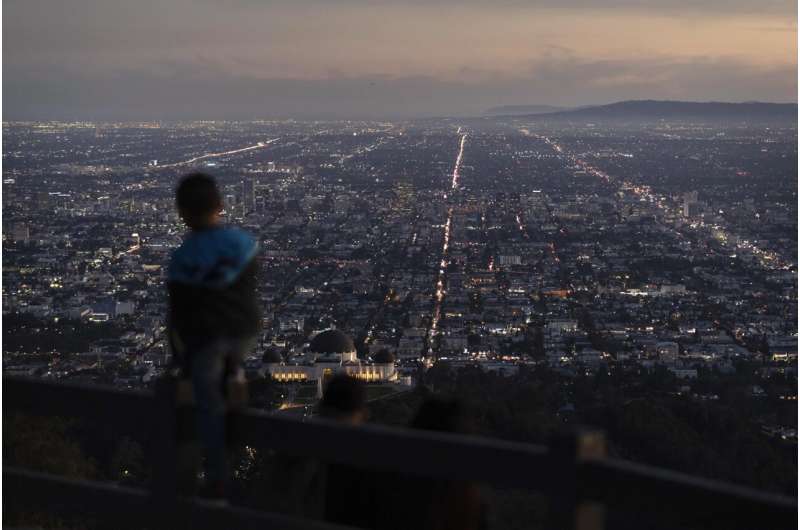
Comparing two United Nations population projections scenarios of 8.8 billion people and 10.4 billion people, Climate Interactive’s Drew Jones found only a 0.2 degrees Celsius (0.4 degrees Fahrenheit) difference. But the difference between no price or tax on carbon and $100 a ton was 0.7 degrees Celsius (1.3 degrees Fahrenheit).
Hare said there is more than a tinge of racism in the myth that overpopulation is the major issue behind climate change.
“One of the biggest arguments that I hear almost exclusively from men in high-income countries is that, ‘Oh, it’s just a population problem,'” The Nature Conservancy Chief Scientist Katharine Hayhoe said. “Nothing could be further from the truth.”
“The 50% poorest people in the world are historically responsible for 7% of heat trapping gas emissions,” Hayhoe said. “Yet when you look at which countries are bearing the brunt of the impacts from climate change, countries like Malawi, Mozambique, Senegal, Afghanistan topped the list.”

And even within countries, it’s the wealthiest who cause more of the carbon pollution, Hare said. Overall, he said, “80% of the population, the global population, emits a small fraction of emissions.”
The world’s population is growing mostly in sub-Saharan Africa and south Asia “and they’re contributing the least to man-made climate change,” said Colette Rose, project coordinator at the Berlin Institute for Population and Development.
Eight nations, five in Africa, three in Asia, are going to have at least half of the population growth between now and 2050, Rose said. They are Egypt, Ethiopia, Tanzania, Nigeria, the Democratic Republic of Congo, Pakistan, India and the Philippines.
Worldwide population growth has substantially slowed, will likely peak sometime this century, and is now down to growing less than 1% a year, Rose said. But carbon emissions are growing faster, at 1% more this year than 2021.
-
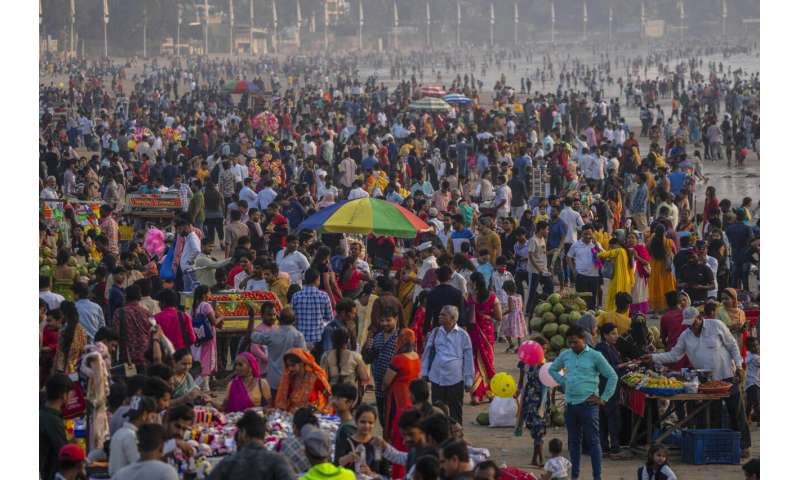
People crowd at the Juhu beach on the Arabian Sea coast in Mumbai, India, Sunday, Nov. 13, 2022. The 8 billionth baby on Earth is about to be born on a planet that is getting hotter. But experts in climate science and population both say the two issues aren’t quite as connected as they seem. Credit: AP Photo/Rafiq Maqbool
-
![Earth at 8 billion: Consumption not crowd is key to climate]()
Shoppers crowd a market in New Delhi, India, Saturday, Nov. 12, 2022. The 8 billionth baby on Earth is about to be born on a planet that is getting hotter. But experts in climate science and population both say the two issues aren’t quite as connected as they seem. Credit: AP Photo/Altaf Qadri
-

People walk along a road during rush hour in Lagos, Nigeria, Monday, Nov. 14, 2022. The 8 billionth baby on Earth is about to be born on a planet that is getting hotter. But experts in climate science and population both say the two issues aren’t quite as connected as they seem. Credit: AP Photo/Sunday Alamba
-
![Earth at 8 billion: Consumption not crowd is key to climate]()
Pakistanis shops in a weekly pet market in Lahore, Pakistan, Monday, Nov. 13, 2022. The 8 billionth baby on Earth is about to be born on a planet that is getting hotter. But experts in climate science and population both say the two issues aren’t quite as connected as they seem. Credit: AP Photo/Fareed Khan
-
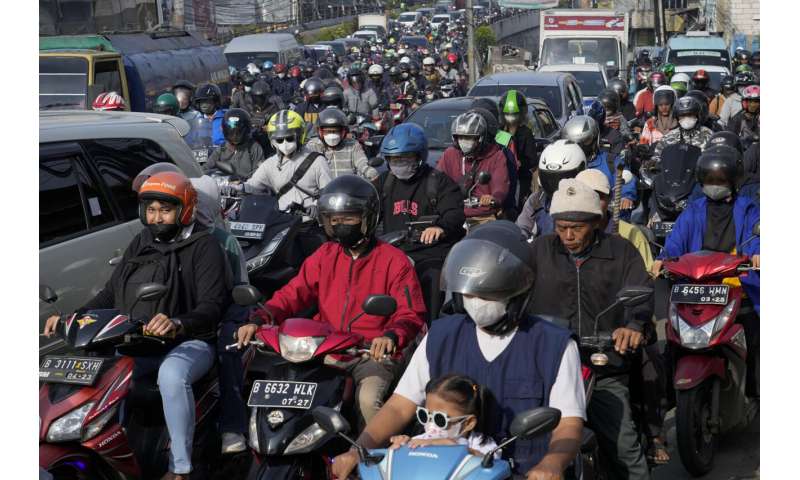
Motorists are stuck in the morning rush hour traffic in Jakarta, Indonesia, Monday, Nov. 14, 2022. The 8 billionth baby on Earth is about to be born on a planet that is getting hotter. But experts in climate science and population both say the two issues aren’t quite as connected as they seem. Credit: AP Photo/Tatan Syuflana
-
![Earth at 8 billion: Consumption not crowd is key to climate]()
Pakistani people shops in the city of Karachi, Pakistan, Saturday, Nov. 12, 2022. The 8 billionth baby on Earth is about to be born on a planet that is getting hotter. But experts in climate science and population both say the two issues aren’t quite as connected as they seem. Credit: AP Photo/Fareed Khan
-

A motorist gives money to beggars while stuck in the morning rush hour traffic in Jakarta, Indonesia, Monday, Nov. 14, 2022. The 8 billionth baby on Earth is about to be born on a planet that is getting hotter. But experts in climate science and population both say the two issues aren’t quite as connected as they seem. Credit: AP Photo/Tatan Syuflana
-
![Earth at 8 billion: Consumption not crowd is key to climate]()
Indian commuters get off trains at the Church Gate railway station in Mumbai, India, Monday, Nov. 14, 2022. The 8 billionth baby on Earth is about to be born on a planet that is getting hotter. But experts in climate science and population both say the two issues aren’t quite as connected as they seem. Credit: AP Photo/Rafiq Maqbool
-

People queue to leave the COP27 U.N. Climate Summit, Monday, Nov. 14, 2022, in Sharm el-Sheikh, Egypt. The 8 billionth baby on Earth is about to be born on a planet that is getting hotter. But experts in climate science and population both say the two issues aren’t quite as connected as they seem. Credit: AP Photo/Peter Dejong
-
![Earth at 8 billion: Consumption not crowd is key to climate]()
With Doha skyline in the background, a man prepares to casts his fishing pole at the Corniche waterfront promenade in Doha, Qatar, Nov. 11, 2022. The 8 billionth baby on Earth is about to be born on a planet that is getting hotter. But experts in climate science and population both say the two issues aren’t quite as connected as they seem. Credit: AP Photo/Hassan Ammar, File
For environmental advocacy groups and officials the issue of population and climate has caused problems.
“Population is an issue that no one has wanted to touch from the very beginning. Too politically sensitive,” Joanna Depledge, a climate historian from the University of Cambridge in England, said in an email. “There are many dimensions, notably in relation to religion and accusations of racism—population growth is mostly concentrated in non-white populations, of course.”
For a long time, the Sierra Club had promoted efforts to try to control the world population, until a couple decades ago, when the environmental group looked harder at the issue and broke down the numbers, said the group’s president, Ramon Cruz. They found the problems were more overconsumption and fossil fuel use and those problems would be the same “at 6 billion, 7 billion or 8 billion” people, he said.
While most environmental groups try to avoid the issue, 11 years ago, when the world hit 7 billion people, the Center for Biological Diversity made special issue condoms with population and environmental messages such as “Wrap with care, save the polar bear.”
© 2022 The Associated Press. All rights reserved. This material may not be published, broadcast, rewritten or redistributed without permission.
Citation:
Earth at 8 billion: Consumption not crowd is key to climate (2022, November 15)
retrieved 15 November 2022
from https://phys.org/news/2022-11-earth-billion-consumption-crowd-key.html
This document is subject to copyright. Apart from any fair dealing for the purpose of private study or research, no
part may be reproduced without the written permission. The content is provided for information purposes only.
For all the latest Science News Click Here
For the latest news and updates, follow us on Google News.




